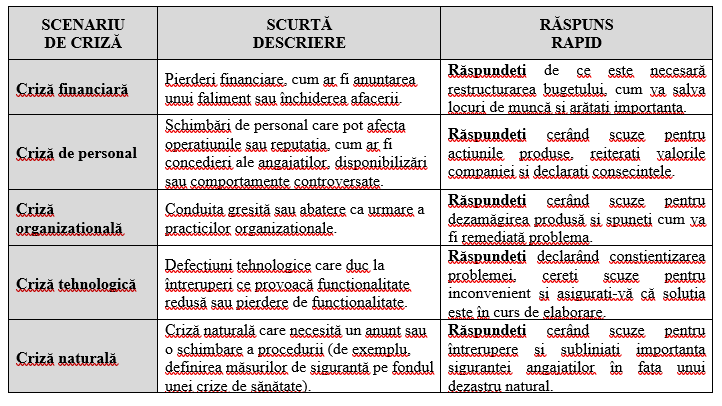
Dictionaries define crisis as a condition of instability or danger, leading to a decisive change. In business contexts, however, a crisis consists in one or more unexpected financial, personnel related, organizational or such events that have negative effects on the company. It happens when least envisioned and that's why we call it crisis and not otherwise. Crises come, of course, in different intensities, but always create great uncertainty, elevate stress and anxiety.
During a crisis, information is most of the times unavailable or inconsistent, and people feel unsure about what they know. This is why behavioral science points to an increased human desire for transparency, guidance, and making sense out of what happens or has happened. The overall recommendation in terms of communication is therefore to do it with urgency and empathy, but especially with transparency. Transparency builds trust as research shows that transparent operations improve perceptions of trust and that communicators perceived to have good intentions are more likely to be trusted, even if their decisions ultimately turn out to be wrong.
Because of its unpredictability, the least and the best we can do is to have a communication plan for such situations. Communication during a crisis is critical. If you don't have a plan, if you waits until it starts, a crisis could easily become a catastrophe. We'll discuss further what crisis communication is and how you can create a plan to protect your organization.
But before, let’s review some common types of crises and see briefly how we can respond to it:

This is custom heading element
Crisis communication refers to the dissemination of information by an organization to address a crisis that impacts the organization’s reputation. When a crisis occurs, top-level managers often tend to focus their communication efforts on their external audiences – business partners, customers etc. – and it's understandable to do so. But employees are also affected, so at least as much effort should be put into communicating with employees, because lack of communication during a crisis leads to confusion and frustration in the workplace. Here are some tips we’ve gathered for you from renowned communication specialists:
• Communicate frequently – if you don't, the employees will get confused and make assumptions. Moreover, they may spread misinformation outside the company without knowing it. Employees start sharing what they know so far about the crisis, even though the information is inaccurate. This is how rumors start to spread across the organization.
• Provide safe channels for giving feedback – having a variety of feedback channels is important because individual employees may view the safety of a given channel differently based on such factors as their relationship with their managers. Having choices about how to give feedback thus helps ensure that people will do so.
• Help employees work at home effectively – in case of emergency, during pandemics or other natural crisis, when employees have to work remotely, they must receive all needed support in order to effectively continue their regular job, so that the business is not disturbed.
• Address concerns about job security – especially during a crisis, employees get worried about the negative effects it may have on their jobs. That may deeply affect their productivity.
• Provide a plan for the future – crisis makes people focus only on the present rather than toward the future. They may lose the direction, and only a plan can give them confidence that things will return to normal in the future, after the crisis passes.
How to make a good crisis communication plan?
While crisis communication can be fairly reactive, it certainly helps to have a clear and robust crisis communication plan to immediately deploy, a well-prepared strategy to implement as soon as an unexpected event threatening the business happens, to make the process easier on team members.
A crisis communication plan is a set of guidelines used to prepare a business for an emergency or unexpected event. These plans include steps to take when a crisis first emerges, how to communicate with the public (ensure information reaches employees, partners, customers, media, the general public, and any other valuable stakeholders), and how to prevent the issue from occurring again.
Conceiving a good, effective crisis communication plan requires a few, but important steps:
1. Identify the goal of the plan – financial, personnel, organizational etc.
2. Identify stakeholders and create a hierarchy for sharing information on the crisis.
3. Create fact sheets – lists of known facts about the crisis, no sugar coating, that will help communicating the right information.
4. Identify and assess example crisis scenarios – it's one of the best ways to anticipate the crises the organization may go through at some point.
5. Identify and answer common questions – one of the best ways to prepare for a crisis is to anticipate the questions employees may have because when it happens, they'll come to you with lots of questions.
6. Identify potential risks.
7. Create guidelines specific to social media – company needs a social media plan that can manage the digital buzz around the business.
In terms of strategy, specialists all over the world make some deeper recommendations, that go with the crisis communication plan we deployed above. These strategies we share with you are built on some best practices of companies that successfully overpassed crises.
Spokesperson Response – the person could be the CEO, a company executive, or someone who best represents the company. It’s important to be a good communicator. During a crisis, it's best if the message comes from the person viewed as an authority on the subject.
Proactive Damage Control – directly linked to identifying potential risks within the plan; think of what you do to reduce or prevent the effects of a crisis before it occurs.
Case Escalation – create an escalation system that can diffuse the issue before it gets out of hand.
Customer Feedback Collection and Analysis – gathering feedback provides valuable insight into how customers and employees are feeling about the company. This allows to spot major roadblocks before they escalate into a crisis.
To sum it up, communication is the key during a crisis. And not only! To help organizations better communicate, especially with their employees, Co-Factor developed an innovative digital platform, which embeds needful functionalities, vital for communication.
Besides the Internal Communication module, extremely useful during crises, with the software developed by Co-Factor, the degree of employee engagement and performance can be increased and measured, all types of feedback can be encouraged and monitored, a specific strategy can be created to support employees to perform, organizational culture can be promoted and employee results can be measured, thus obtaining a clear picture of employee spirit, engagement and performance.





